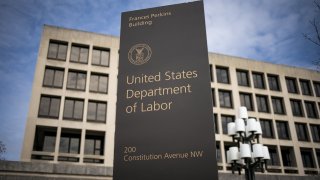
- The $900 billion Covid relief package offers an extra 11 weeks of unemployment benefits and a $300 weekly increase in payments.
- Some states have begun disbursing that assistance.
- Workers who haven't yet gotten funds are wondering what they have to do to get aid. Many will receive it automatically. Others will have to act and should watch for updates from their state labor agency.
Confusion has swelled among many workers unsure of how — or when — they can collect extra unemployment benefits offered as part of the recent Covid relief package.
The $900 billion measure provides an additional 11 weeks of jobless benefits and a $300 increase in weekly payments.
But a patchwork of different unemployment programs, which carry different rules, and communications from state agencies have led to uncertainty around receipt of that aid.
More from Personal Finance:
The unemployment labyrinth may have killed this musician's dream
How the $600 stimulus checks could affect your tax refund
Biden will call on Congress to forgive $10,000 in student debt
That widespread distress is evident from multitude posts from workers on social media sites such as Twitter, Facebook and Reddit, and from unemployment experts following such developments.
"There is a great deal of confusion out there," said Michele Evermore, a senior policy analyst at the National Employment Law Project.

Automatic benefits
Money Report
Many workers will get the aid automatically, according to communications from federal and state labor departments.
For example, workers don't need to apply or take additional action to get the $300-a-week enhancement. States will include the stipend in individuals' typical unemployment payments if they're eligible for at least $1 of standard benefits per week.
Workers only need to continue filing their weekly unemployment certifications to receive it. The subsidy is available until March 14.
Workers also won't need to act if they'd been actively filing for (and hadn't exhausted) benefits in certain programs, such as Pandemic Unemployment Assistance (for the self-employed) and Pandemic Emergency Unemployment Compensation (which paid additional state benefits), according to U.S. Labor Department guidance.
However, aid may arrive at different times, depending on how quickly certain states can update their systems and disburse funds.
Many, but not all, have begun paying an extra 11 weeks of benefits and the $300 stipend. Workers will receive all benefits owed, back to early January, even if they arrive late.
"I don't anticipate any state taking more than a few weeks," Evermore said. "So hopefully everybody will at least get money before rent is due next month."
Some need to act
But some workers will have to act to get additional benefits, according to the U.S. Labor Department, which has caused a level of confusion.
That's true for some workers who had run out of benefits even before the $900 billion relief law extended them into 2021.
It's also true for those who'll need to transition onto a different benefit program. For example, many workers who'd exhausted their original entitlement of PEUC benefits (13 weeks) last year were eligible to switch to the PUA program to continue receiving aid through the end of 2020.
Now, those workers must revert to the PEUC program, per federal rules.
"You must reopen your existing PEUC claim," the guidance says of such workers.

Workers should monitor their state labor websites for additional information around how this will work, Evermore said.
Some states have also inadvertently put out conflicting information to claimants as they update their systems to account for the new law.
The Florida Department of Economic Opportunity, for example, had notified workers of a deadline to complete a new application for PUA, but subsequently said to disregard that instruction, according to a memo posted in a member-only Facebook group for unemployed workers in the state.
"This is a known issue that should be corrected soon," the memo said. "The Department is working diligently to implement the CARES Act program extensions."
Some workers, like those in California, are seeing a $0 benefit entitlement in their online accounts despite the 11-week extension, according to posts on Reddit. A similar trend is occurring in other states across the country, likely attributable to program delays, Evermore said.






